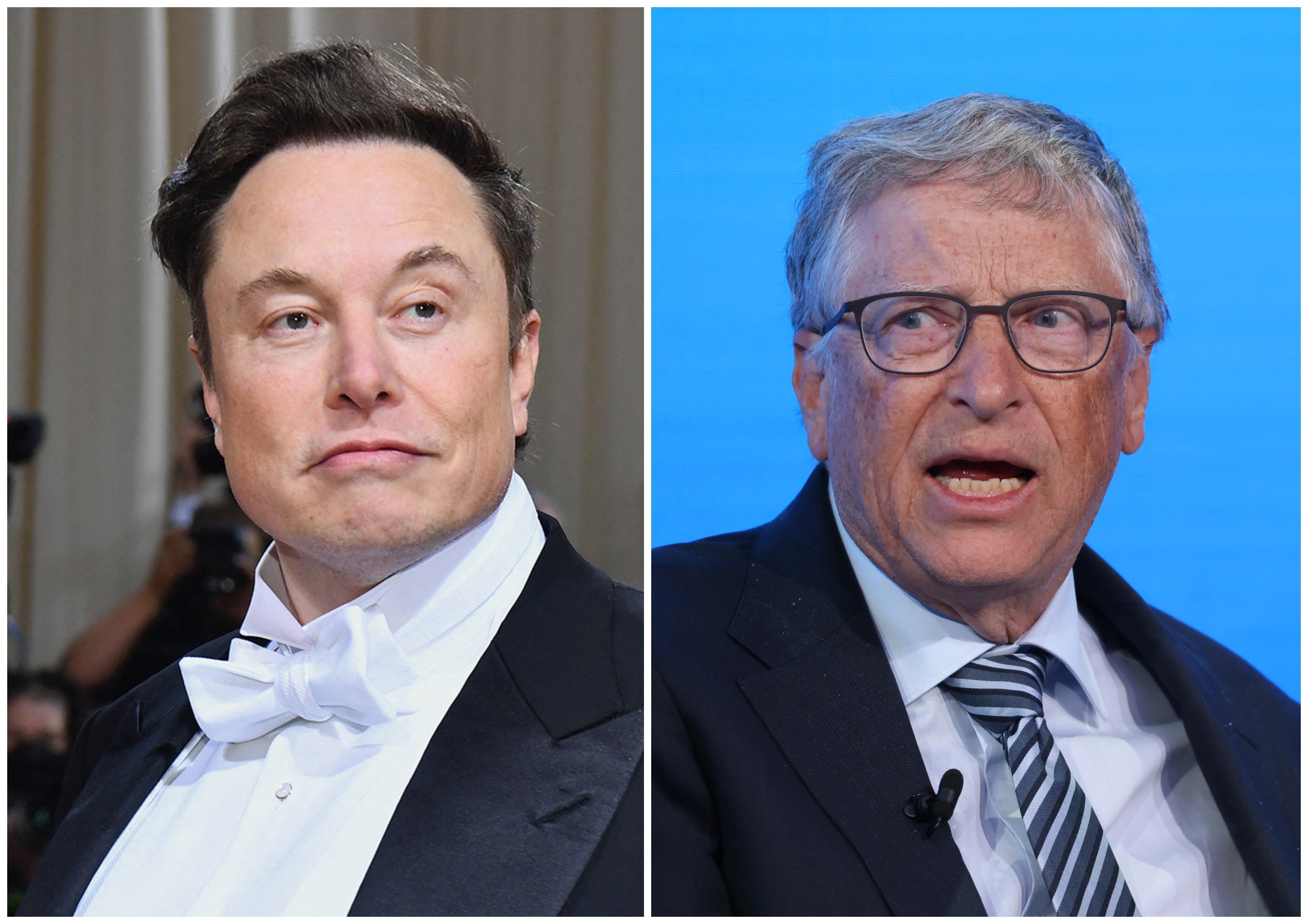BILL GATES Vs. ELON MUSK: The Billionaire Battle Over AI’s Future Just Got Heated! Gates Pushes Back On Musk’s ‘Jobless Future’ Vision – Here’s Why He Thinks Universal High Income Won’t Work.
Bill Gates vs Elon Musk: The AI Billionaires’ Battle for Our Future & Why Gates Rejects Musk’s ‘Jobless Future’
The rapid development of Artificial Intelligence (AI) has sparked a major debate between the world’s most powerful people. The two titans, Bill Gates and Elon Musk, have very different views on the impact of AI on society. This is especially true when it comes to jobs and how the economy works. This article will delve into their differing ideas. We’ll look at Elon Musk’s idea of a “jobless future,” which is often associated with Universal Basic Income (UBI). We’ll then explore Bill Gates’ strong objections, showing why he doubts UBI is a good plan. We’ll take a detailed look at their views, along with facts and expert opinions, to get a clear picture of what this means for all of us.
The ‘Jobless Future’ Vision: Elon Musk’s AI Predictions
Elon Musk often talks about how AI will change our world. He sees a future where many jobs will disappear. It’s a bold warning.
Musk’s Concerns: Automation and Mass Unemployment
Musk has frequently warned that AI could replace many human jobs. He believes that machines will soon perform tasks across many sectors. For example, he has pointed to areas like trucking, manufacturing, and customer service. He says the speed and scope of AI’s job replacement will be huge. Imagine robots driving trucks or software handling all customer calls; that’s part of his concern.
Having seen so many jobs disappear, Musk has argued that Universal Basic Income, or UBI, will become necessary. He believes that UBI could provide enough money for people to live when there are no more jobs. So how would we pay for this income? Musk proposes taxing the massive productivity gains from AI. He sees UBI as a basic safety net, similar in spirit to current welfare programs but much broader. It would not be tied to employment or job search.
Musk and his supporters point to many signs of support for his “jobless future.” History shows that new technology always changes jobs. The invention of tractors meant fewer farm workers were needed. Factories created new types of jobs but also changed old ones. Today, AI is rapidly improving tasks that were previously only possible for humans. This trend could accelerate, automating many types of jobs and changing the job market rapidly.
Bill Gates sees the role of AI in society very differently. He does not believe it will cause a widespread “jobless future.” Instead, he sees a world where AI helps us do more.
Gates’ Optimism: AI is an Assistant, Not a Replacement
Gates argues that AI will primarily work alongside humans, not replace them. He believes that AI will help us improve our skills and become more productive. For example, AI tools could help doctors diagnose diseases faster or help engineers design better products. It could also create entirely new types of jobs that we can’t even imagine today. This means we’ll be working with AI, not against it.
Bill Gates is very skeptical about Universal Basic Income. He questions whether UBI is really a good, long-term solution to future financial problems. Gates worries about the enormous cost of UBI. He also thinks it could discourage people from working or innovating. Some studies have also shown that UBI could cause prices to rise too high. This means that the money people receive will not buy much.
Gates offers a different vision for a world with AI. He has always pushed us to learn new things and develop new skills. He believes that education and training programs are extremely important. These programs will help people move into growing fields. Gates believes that AI will create more jobs in areas such as health care, education, and caregiving. The ability to adapt and learn new things will be important skills for everyone.
Analyzing the Cost and Sustainability of Universal Basic Income (UBI)
Providing everyone with a basic income would be a huge expense. Experts estimate that such programs in large countries could cost trillions of dollars a year. Funding UBI would mean very high taxes, perhaps on businesses or property. Some economists also worry that if everyone gets money without working, the prices of goods and services could skyrocket. This inflation could make UBI payments less useful.
The Economic Potential of an AI-Enhanced Workforce
On the other hand, an economy where humans work closely with AI promises huge benefits. Companies that have used AI to assist their employees often see productivity soar. This means they can produce more goods or provide more services with the same amount of effort. Increased output often leads to higher profits, which can mean better wages for workers. This approach aims to increase economic growth and share wealth, rather than just provide basic support.

To truly understand the impact of AI, we need to hear from a variety of experts and look at the actual numbers. What do others say about the future of work with AI?
Many economists are studying how AI will change jobs. Reports from groups like the World Economic Forum suggest that AI will create new jobs while displacing or eliminating others. They often talk about “transformation” of jobs rather than mass unemployment. Some leading thinkers argue that while some jobs will disappear, new types of jobs will emerge. They emphasize the need for people to learn new skills to adapt to these changes.
Real-World Applications of AI: Case Studies and Statistics
AI is already at work in many places. In healthcare, AI helps doctors detect diseases earlier. In finance, it helps detect fraud. Customer service agents use AI chatbots to answer simple questions, freeing up employees to focus on more difficult issues. While some fear these tools will eliminate jobs, others see new jobs in managing, training, and building AI systems. Data shows growth in AI-related fields like data science and machine learning engineering.
Several places have experimented with UBI to see what the results are. Finland has done a UBI trial, and cities like Stockton, California, have done their own. These trials have shown mixed results. Some places found that people used the money to improve their lives, go back to school, or start small businesses. Others have shown little change in work habits. These real-world experiments give us important clues about whether UBI will work. They also show how complex the issue really is, sometimes supporting Gates’ concerns, sometimes supporting Musk’s ideas.
The future of AI may seem uncertain, but there are steps you can take to prepare. Preparing now can make a big difference.
The most important thing you can do is keep learning throughout your life. Think about the skills that are needed in the age of AI, such as programming, data analysis, or working with smart machines. Websites offer many online courses. Local schools also have programs to teach new skills. Being good at critical thinking and problem solving will always be useful, no matter what changes AI brings.
Some skills are hard for AI to replicate. These are often called “soft skills.” Skills like creativity, understanding other people’s emotions, and speaking clearly are important. AI can crunch numbers, but it can’t feel or imagine like a human. Work on developing these human-centered skills. This will help you stand out in any job.

It’s also important to get involved in discussions about AI’s impact on society. Find out what lawmakers are saying about AI and the future of work. Be vocal in advocating for policies that support education and training for all. Your voice can help shape how the world responds to the rise of AI. Staying informed and engaged will help build a better future for all of us.
The debate between Bill Gates and Elon Musk over the impact of AI on jobs and the idea of Universal Basic Income is an important one. Musk warns of a future with fewer jobs, proposing UBI as a solution. However, Gates sees AI as a tool to improve human jobs and points out the problems with UBI. Instead, he emphasizes training and new opportunities. Clearly, preparing for an AI-influenced future means always learning, building new skills, and adapting. This big conversation is ongoing. Our path forward will likely require a combination of amazing new technology, smart regulations, and everyone being ready for what’s coming.





